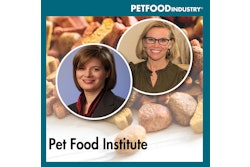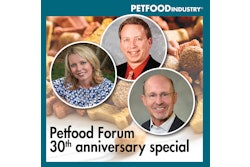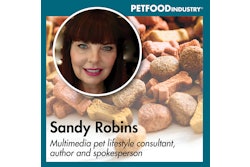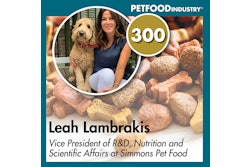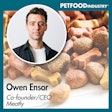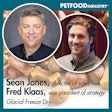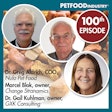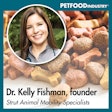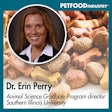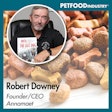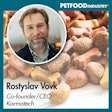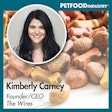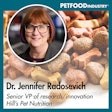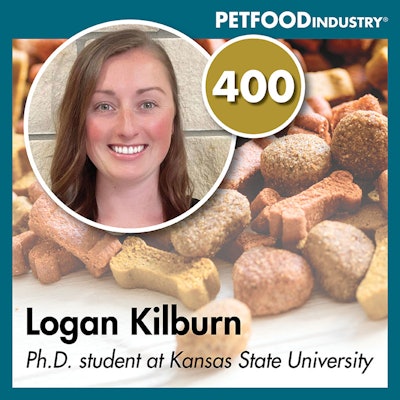
Companion animal nutrition Ph.D. student at Kansas State University Logan Kilburn sat down with me live at Petfood Forum 2022 to discuss the future of the pet food industry. We covered everything from what her generation is looking for in an employer to how she hopes to impact the industry, so tune in for insights on how to attract and retain new talent as well as what pet food might look like down the road.
Lindsay Beaton – Editor, Petfood Industry magazine and Host, Trending: Pet Food podcast
Hello, and welcome to Trending: Pet Food, the industry podcast where we cover all the latest hot topics and trends in pet food. I'm your host and Editor of Petfood Industry magazine, Lindsay Beaton, and today we're recording live from the exhibit hall floor of Petfood Forum 2022 in Kansas City, Missouri, where we're celebrating 30 years of Forum. As we use that celebration to focus on how much the industry has grown in the last three decades, and Forum along with it, I thought it fitting to bring on a guest who represents the future of the industry: Logan Kilburn, a Ph.D. student focusing on companion animal nutrition at Kansas State University. Hi, Logan, and welcome!
Logan Kilburn – Ph.D. student, Kansas State University
Hello, happy to be here!
Beaton: If you’ve stopped by the Student Program during Petfood Forum in the last few years, you might recognize Logan's name. She's presented plenty of research with us, but in case you've not had the pleasure of speaking with her, here's what you need to know. Logan is originally from Muscatine, Iowa. She completed her bachelor's degree in Animal Science at Iowa State University in December of 2016. She then held a nutrition internship at the Omaha Zoo and Aquarium in the spring of 2017. She returned to the Animal Science department at Iowa State University in the fall of 2017 to pursue a master's degree. Her master's work evaluated cricket meal and high-fat diets in dogs. After completing her master's degree in December of 2019 she started her Ph.D. at Kansas State University, working with Dr. Greg Aldrich, in January of 2020. Her dissertation research is focused on the utilization of fermented products in pet food.
With all the industry discussions around attracting and retaining talent to grow the next generation of pet food, I've brought Logan on today to help me answer this question: What does the future of the pet food industry look like?
So Logan, first I want to talk about how you ended up here. And we're going to set that up as a way to see maybe where you're going. So how did you come to be a Ph.D. student studying companion animal nutrition?
Kilburn: That's a great question. So I'll kind of start from probably the way beginning. As a kid, I always loved animals. And what do you do as a kid? What is your career path? When you're obsessed with animals, it's really to go to vet school. So really, that was my dream since I was very young. That's always been the goal. I never really strayed from that. So I was never the kid, you know, going to all these different career opportunities, like this was my path. And, you know, I was determined to achieve that. I decided to do my undergraduate at Iowa State University, which was only actually about two-and-a-half hours from my hometown. So pretty convenient. I knew I always wanted to go to Iowa State because it was a great ag school. I grew up very close to the University of Iowa, so grew up a Hawkeye fan, so it was kind of that rivalry there. But everyone was very understanding about [how] for my career path, I would say it was definitely the best decision for me. So I decided to go ahead and pursue my undergrad degree in Animal Science at Iowa State.
Again, I was focused on that pre-vet route, I didn't really know that there were other options to work with companion animals, specifically. Luckily, probably my Junior year I started taking more nutrition-based classes. So I was basically done with all those intro courses and I was diving in deep more to the specialties, so genetics, nutrition, all of those components in animal science. And I realized I really loved the nutrition component. So I was talking to my advisor, trying to get a feel of what is in the industry, what can I do with companion animals and nutrition? And she mentioned grad school to me, which honestly I had no idea what that even was. I was asking all these questions: How do you go about getting into grad school? How is it different than vet school? What will I even be doing? I had no idea. So I was very lucky to get that mentorship from her. And she could kind of guide me and explain, you know, these are the opportunities. These are the different professors you could talk to, to do companion animal research.
Then when I graduated, I decided to leave Iowa State for a semester to do an internship at the Omaha Zoo, specifically in the nutrition sector. So I had a pretty big role in the lab as well as being able to actually create the diets for the animals every morning; I was up in the production area, putting all the ingredients together to give to the carnivores specifically. So I thought that was a really cool experience to kind of jumpstart into grad school. I did get a lot of experience in the lab as well, so I was able to do nutrient analysis of various feedstuff throughout the zoo and I really enjoyed it. So I knew from then, this is really the direction I wanted to go.
So I started looking into possible opportunities for grad school. And then a lot of people recommended a new hire that was coming to Iowa State, so I reached out to her and was able to start my master's with her that fall. So I was very lucky with the timing [and] how everything worked out. And then after my master's I knew I really wasn't done. I wanted to learn more, specifically in this industry. From my master's going to Petfood Forum, I actually met Dr. [Greg] Aldrich, so it was kind of a cool thing that I was able to just get to know him, get to know his students and then join his lab as well. I knew him for years before actually joining his lab, which I think was a great opportunity. Now I'm here and I'm very committed and passionate about this industry. So I'm excited for the future. And I'll definitely stay in this industry for a long time.
Beaton: So there is a lot of talk about how to bridge the gap between academia and the industry, because there really are not a ton of companion animal nutrition-focused programs. And unless you sort of fall into it or have an advisor like you did, who went, "Hey, this industry is an option," a lot of pre-vet students might not make the connection that there could be something else they could do if veterinary school ends up not being for them. Or even in other parts of the industry, you know, manufacturing, people don't necessarily think about pet food, other than just having it fall into your lap. What do you think the industry could do to better promote themselves to academia so that by the time people are looking for careers, they see pet food as an option?
Kilburn: That's a great point. And I completely agree, I think we definitely need to get the industry into colleges, into universities, I think a great way to do that is the career fair. Those are huge events every year. Specifically, at Iowa State they have a massive College of Ag career fair. But I think that's a good way to do it, promoting different companies through colleges, having professors be able to have that industry connection, talking to companies and having the advisors, the mentors for these undergraduate students already familiar with those companies. And they can kind of say, "Here's an opportunity I've heard about." I also think in the near future there'll be a lot of new companion animal research opportunities, professor faculty positions ... as everyone's really seeing the need for this industry, students are wanting to focus in companion animals. And I know that's something I was looking for as an undergrad and there just wasn't a lot of opportunity. But I see even since I've left my undergrad, there are a lot more opportunities now to take those courses specifically on companion animals, whether that be companion animal nutrition, pet food processing, I think it is a growing sector because there is such a high demand for it.
Beaton: I want to talk a little bit about your research, because obviously that's how I know you is through your research with the Student Program that you've done over several years here. So what has some of your favorite research been, and then let's get into what your current research is about and why you're focusing on it.
Kilburn: So I think I've kind of come back around to this whole sustainability idea. During my master's I got to work with cricket meal as a sustainable protein source, a novel protein source, and that was really exciting. And I think as the industry is going to continue down this path of sustainability, those sustainable ingredients, their evaluation, is going to be important. So it's kind of been funny now that I'm starting my Ph.D. research, looking at it again, and enhanced dried distillers grain products, which will develop as a sustainable product. But I think that's really been exciting to see; it's not only evaluating this ingredient in the animal, comparing digestibility fecal scores, maybe some blood parameters, overall health, but now we're also looking at the environment. So we're kind of a big picture here — not just solely focused on the animal itself, but now we're looking into, how can we help the environment with the products we're including into pet food? How can we decrease that carbon footprint of the pet food lifecycle? So I think that's been really exciting to kind of see that there's a bigger goal for this. And I think it's going to continue to grow. So to be able to kind of jumpstart it now, I think is a great opportunity.
Beaton: You've just mentioned one of the key industry words right now: Sustainability. I know as we've just wrapped up our Student Program today we had presentations on research behind vegetarian diets and there were a couple of different things focusing on raw. It's clear that the academic research is starting to really focus on the trends that are already happening on the consumer side. How much of that are you seeing as somebody who's in the middle of doing research and your fellow students working on that? How much are you guys paying attention to the trends that are happening and going, there's an opportunity here, because the research is behind some of the trends, it's lagging? And so you're right, that there is a ton of opportunity for research in these spaces. Insect protein is another huge one that you mentioned, is that something that you are prepared to take advantage of? Is that something you're seeing your colleagues take advantage of in terms of, there are serious gaps here and we can actually do some major research that could have some big impacts for people in the industry?
Kilburn: The pet food industry is so unique and I think it's super interesting to be working in it because it's really driven by pet owners. So it's really driven by what are consumers wanting in the market and not necessarily by research first, so then we're having to come in and support those claims, support what consumers are wanting. And I think it's a great opportunity for us; this industry is always going to continue to grow. So I think to be able to provide that science backing that's needed for those vegetarian diets, for sustainable ingredients, it's kind of hard to beat the consumer trends. So we in the industry, in research, we're always looking, we're trying to look ahead, we're trying to think of, okay, what trends are happening in the human sector, because pet food typically follows those trends in the human industry. So we are trying to look ahead to see what are we going to do next, what is going to be the next new thing next year, two years from now? Well, that's really difficult. We're really trying to beat the consumer demand. But that's difficult; I think we're in a really good place where we're able to see these trends, whether it be consumers demanding a product, a company wanting to start a new product and be able to test those ingredients in a research setting. And to provide that scientific background, I think is very important.
Beaton: Since you're touching on a little bit, I want to dive into what your current take on the pet food industry is as someone who is researching within it, but not yet fully part of it, but somebody who's hoping to be involved in it for a good long time. What excites you about the industry? And what are some of the challenges you see right now that you think need to be addressed, and maybe you're hoping to help with later on down the line?
Kilburn: I really think the most exciting thing about the pet food industry is the growth in the different products that are constantly emerging in the industry. There's always going to be job opportunities and a lot of people have a stake in this. So I have two dogs at home, and it's important to me that I'm providing them the correct nutrition. So I think that's important to everyone. I think this industry is really unique in a lot of different ways. As pets are becoming family members, you're wanting to feed them as good as you're eating, all of those things really enhanced the industry and make it a great industry to be involved in, especially as a student who's rising into those positions in industry, or academics or whatever you're interested in, there are going to be a lot of opportunities.
I think a concern for the industry — like I kind of mentioned before it is so consumer-driven. So that's really difficult. We're wanting to provide the science behind this and it's kind of difficult to do that sometimes based on consumer perception. I think marketing has a lot to do with that. So if we're able to market the scientific research for some of these ingredients are really to support that ingredient, I think is kind of where we're struggling, and how do we market these certain things? And how do we get the education across to consumers, to pet owners? You know, not every pet owner is going to be able to come to Petfood Forum, for example, or go to those conferences where we're presenting all this research. So I think the challenge is, how are we going to get this out into the public? How are they going to know what we're researching, what the next new trend is? What's really best for their pet? I think it is difficult and I think we're starting to educate the public, just industries going out discussing their research, specifically in universities, being able to educate undergraduate students, they go home and tell their parents, they tell their neighbors like all of that, I think that's a great way to do it. And I think we're getting there. But I think the marketing is still going to be a challenge for a few years to come.
Beaton: I want to bring up another challenge of the industry because it directly impacts you and your cohorts, and that is corporate culture, and the cusp we're at right now of what needs to be and should be a significant shift in the way everybody views their careers and the way companies view their employees. It's been a recurring theme at a lot of different sessions throughout Petfood Forum. What are you and your cohorts looking for in a company? What is going to bring people to this industry and to these companies? To anybody who might be listening, who is waiting a couple years for you guys to graduate and wanting to bring you into their ranks, what are the important things? Where do they need to be?
Kilburn: It was really interesting, yesterday in the student panel we discussed community structure, how we are really wanting to work in an industry, what are we looking for in a company, when we mentioned it's really an employee market so we can kind of dictate what we're looking for. And I think my generation is really focused on a work-life balance. So if we're able to go into a company and get a feel for their culture, how they handle certain situations, if you need time off, if you're sick, have a family at home, I think that's really important to my generation specifically, and looking for ways to do that. We're not opposed to trying new things: So if maybe we could do remote working for a couple of days out of the week and then go into the office the other days.
I think there's a mixture of things that we are looking for and that company culture is very important to us. Do we work in a team, is it individual-based? How do people really interact with each other? Is it a happy environment to work in? A lot of that comes down to mental health as well, which is a huge topic among my generation. Are we going to be happy there long-term? Are we going to be able to shut our minds off, take a break from work and enjoy things in our personal life, whether it's some hobbies, spending time with our pets, for example, that's very important. Honestly, some things like can you bring your pets into the office, all of those little details I think we're looking for.
And I think it's really going to change the industry, especially in the next couple of years when we're all starting to look for jobs, we're kind of the first generation that has really had the straight background in the pet food industry because it is such a new area. So we are going to be able to kind of pick and choose what we're exactly looking for. And I think that's important for companies to realize, maybe they should develop company culture, or how they're going to explain that in interviews when we're asking those questions, how are they going to come back and respond to us? How are they going to be able to show the beneficial effects of working in their company? Do they have specific things that they do as a company, you know, do they play in a softball league in the summer, stuff like that? I think that's what we're really looking for, is not necessarily just going into the office, working and being done. But is there a cohort among that company? Do you do things outside of the company together? Is it really an enjoyable place to work at? And I think that's what it really comes down to.
Beaton: I agree. And I think that's a very important conversation for us to be having right now, as an industry that wants to continue to grow and continue to survive in the middle of what really is going to end up being a seismic shift in the way companies do business and people look for and retain their own employment with so many options out there. Right now it's the companies who genuinely, genuinely believe and take care of their employees in a myriad of ways who are going to succeed.
You are on the cusp of entering the industry, you still have another year of your Ph.D. program and then you'll be evaluating your options. And obviously you're starting now; I know that academia has a draw for you. And so I want to ask you what you would like to do with that specifically about academia, because we've talked about academia being a bridge to the industry and how we can further that. I feel like you want to be part of expanding the programs, part of expanding the bridge between academia and industry. So what are your thoughts on that? And what are you maybe hoping to accomplish in the next five to 10 years in the industry?
Kilburn: So my interest in academics really started during my master's; I had a really big role as a teaching assistant and I loved it, I was able to teach a two-hour lab every week. And I think the most important thing to me is I saw those students engaged in what I was talking about, I was able to relate to them. And I was also able to provide other opportunities that they didn't think about: They were able to talk to me about, how would you get involved in the companion animal industry? How would you be involved in pet food, which I think a lot of them are looking for, like I mentioned, being able to kind of provide that guidance for them was very rewarding for me, and to see them after I taught a lecture, you know, the light kind of went on and they're able to understand what I was trying to teach them. What is the point of this lecture. That's really what drove my passion for teaching.
But I think the way to kind of bridge the gap and really support the industry is education. So if we're able to start with a freshman in college and [are] able to open their doors to the pet food industry, and then again they're telling their friends, they're telling their family about all of this information that they've learned in class, and just being able to spark their interest. I think that's really important when you're starting your undergrad career. What are you interested in? Why are you here? What is going to drive you to be successful in the future? And I think sparking their interest right away with those intro courses — like, you have all these opportunities. Specifically, when I'm talking about animal science, we have cattle, sheep, goats. And now if we're talking about pigs, or now we're adding companion animals, like there's all these different avenues that students can go into. And there's a lot of great opportunities with that. So I think really, as a faculty member at a university, you really are the gap between the industry and new upcoming talent, you're preparing them for the industry.
And I think, for example, like going to Petfood Forum, that's what's developing these networking, these connections that I would be able to then bring back into an educational setting and explain my experiences. Explain what Petfood Forum is, like, be able to have students attend events like this, because companies are always looking for new talent, especially now. So I think being able to just bridge that gap between the industry and academics, and we are doing that today. We're working with companies to do the research projects. We're getting our names out there, walking around Petfood Forum. People recognize I'm from Kansas State University working with Dr. Aldrich. And that's a great opportunity for me to just talk to the companies and talk to the companies I'm doing research with, maybe look into companies doing different research. And I think it's a really cool experience. And I'm very excited wherever I end up after I graduate, but I think any sector of this industry is a great place to be.
Beaton: You mentioned the student panel that we had yesterday as part of the Student Program. It was very career-focused and giving advice to students on how they might enter the industry. And one of the key things that came up was just networking, making connections, reaching out to industry, people getting your name out there, so people know who you are. And then when you are looking for a job, perhaps they've already been following you for a couple years. I want to flip the script around, because obviously the majority of my podcast listeners are industry people. Say you're a professor five years from now. Would it behoove people in the industry to reach out to you to make that connection? Would academia be receptive to the industry reaching out to them and saying, "Hey, we would love to be a feeder option for students for internships, you know, can we at least get on your radar and help your students understand that pet food is an option?" Do you feel like that's something that could very easily go both ways, or would there be pushback on either side?
Kilburn: Oh, no, I 100% think that would be a great opportunity for everyone — the companies, the university, the students, I think that would really help develop the programs even more. So if companies are coming to those universities, if they're putting their name out there, they are looking for interns, and then you know in the foreseeable future that can mean employees as well. So I think it really is important to get their name out there to get students interested in their company. And a lot of students don't know these companies exist, or don't know what they can do in the pet food industry. And there's so much more than diet formulation, there's processing, there's marketing, there's a lot of opportunities there, where I think if students only knew about them then that would just seal the deal.
Beaton: Let's wrap up by talking about the future of the industry, of which you will be a significant part. What do you hope for the future of the industry? What do you want it to look like?
Kilburn: That's a great question. I think, honestly, this industry is just going to continue to grow. And I would love to see it flourish even more than it already is, which seems crazy to think about — how can it get any bigger than it already is now? But I think we might need to shift focus into more of those sustainable products, kind of like what I was mentioning before, especially my generation who's becoming more concerned about sustainability. So I think we are going to maybe need to shift into more of those sustainable ingredients, and how can we incorporate those into diets? How can we maybe change the narrative of some of these ingredients? Corn, for example: A lot of pet owners don't really see corn as a high-quality ingredient in pet food. So kind of shifting those thought processes and being able to explain to pet owners, this is why we're including it. And it could be because of that sustainability factor, which I think is going to be increasing in importance as we're moving on, as we're more concerned about the environmental impact of not only the pet food industry, but every industry in the world today.
Beaton: Thank you very much for your insights, Logan. Especially with the current shifts in employment, from employee expectations to employer culture, it's really important for the industry to be future-focused and really lean into the reality of what's going to be needed from a company if they want to attract and retain top talent to help them succeed for the next 10, 20, even 30 years. Before we close out today, let's do a little plug: Where can people find you?
Kilburn: I think the best place would be on LinkedIn, so you can go ahead and just search my name, Logan Kilburn, and you should be able to find it there.
Beaton: Perfect. That's it for this special episode of Trending: Pet Food live from the Petfood Forum 2022 show floor. You can find this on www.PetfoodIndustry.com, SoundCloud or your favorite podcast platform. You can also follow us on Instagram @trendingpetfoodpodcast. Once again, I'm Lindsay Beaton, your host and editor of Petfood Industry magazine, and we'll talk to you next time. Thanks for tuning in!


